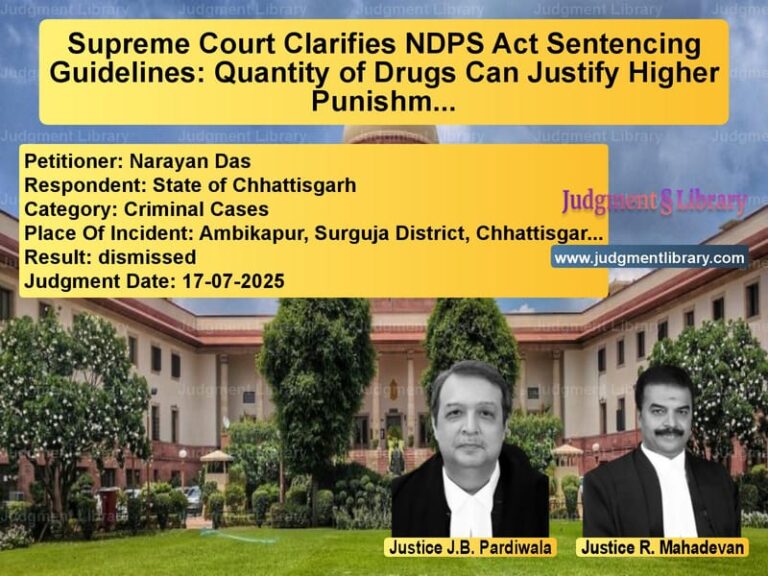Income Tax Dispute: Supreme Court Remands Case on Reassessment and Escaped Income
The Supreme Court of India, in its judgment dated April 16, 2019, ruled on a significant issue concerning income tax reassessment and the concept of escaped income. The case, Pr. Commissioner of Income Tax Central 2 vs. M/s A.A. Estate Pvt. Ltd., revolved around a reassessment notice issued by the tax authorities based on information seized during a search operation. The Supreme Court set aside the Bombay High Court’s order and remanded the case for reconsideration.
Background of the Case
The dispute pertains to the assessment year 2008-09. The respondent, M/s A.A. Estate Pvt. Ltd., is a company engaged in real estate development. The case arose from a reassessment notice issued under Section 148 of the Income Tax Act, 1961, seeking to add an alleged unaccounted sale proceeds of Rs.1,70,94,000 to the company’s taxable income.
The reassessment was initiated based on a document (Annexure-AB-1) seized from a separate entity, M/s Ashok Buildcom Ltd., during a search operation on November 30, 2007. The document allegedly indicated unaccounted transactions involving M/s A.A. Estate Pvt. Ltd.
Timeline of Events
- December 24, 2009: The Assessing Officer (AO) completed the original assessment under Section 143(3) read with Section 153A, determining the total income as Rs.7.77 crore.
- September 22, 2010: A notice under Section 148 was issued, reopening the assessment.
- December 30, 2011: The AO completed the reassessment, adding Rs.1.70 crore as escaped income.
- February 21, 2013: The Commissioner of Income Tax (Appeals) upheld the reassessment order.
- February 5, 2014: The Income Tax Appellate Tribunal (ITAT) reversed the decision, ruling in favor of the assessee.
- January 9, 2017: The Bombay High Court dismissed the Revenue’s appeal, affirming the ITAT’s ruling.
- April 16, 2019: The Supreme Court remanded the case for fresh consideration.
Arguments by the Revenue
- The Revenue argued that the reassessment was valid as the seized document suggested unaccounted sales.
- It contended that there was reason to believe that income had escaped assessment.
- The Revenue also submitted that the High Court erred by dismissing the appeal without properly examining the material evidence.
Arguments by the Respondent
- The assessee contended that there was no direct evidence linking it to the seized document.
- It argued that the reassessment was based on mere suspicion, without independent verification.
- The assessee maintained that there was no material proof that the alleged unaccounted sale proceeds belonged to it.
High Court’s Findings
- The Bombay High Court dismissed the Revenue’s appeal, holding that there was no substantial question of law involved.
- It ruled that the reassessment was based on unverified and indirect evidence.
- The Court observed that the ITAT had correctly deleted the addition, finding no direct nexus between the seized document and the respondent.
Supreme Court’s Observations
- The Supreme Court noted that the High Court had failed to frame substantial questions of law under Section 260A of the Income Tax Act.
- It held that the High Court’s order did not conform to the mandatory procedural requirements for hearing appeals.
- The Court found that the Revenue’s case involved legal questions that required detailed examination.
Final Judgment
- The Supreme Court set aside the Bombay High Court’s order.
- The case was remanded to the High Court for a fresh decision.
- The High Court was directed to frame and decide the following questions:
- Whether the reasons for reopening the assessment were legally valid?
- Whether the case qualified as an escaped assessment under Sections 147 and 148?
- Whether the seized document from M/s Ashok Buildcom Ltd. could be used to presume unaccounted income of the respondent?
- The Supreme Court clarified that it had not expressed any opinion on the merits of the case.
Legal Implications
- This ruling reinforces the requirement for courts to properly frame substantial questions of law in tax appeals.
- It clarifies that reassessment notices must be based on concrete evidence rather than assumptions.
- The judgment upholds the principle that a seized document from a third party cannot automatically be used against an assessee without corroborative evidence.
Conclusion
The Supreme Court’s ruling highlights the importance of procedural fairness in tax reassessment cases. By remanding the matter for fresh consideration, the Court ensures that critical questions of law are addressed and that reassessment is not based on mere suspicion. This judgment sets a precedent for future disputes concerning escaped income and the burden of proof in tax cases.
Petitioner Name: Pr. Commissioner of Income Tax Central 2.Respondent Name: M/s A.A. Estate Pvt. Ltd..Judgment By: Justice Abhay Manohar Sapre, Justice Dinesh Maheshwari.Place Of Incident: Mumbai, Maharashtra.Judgment Date: 16-04-2019.
Don’t miss out on the full details! Download the complete judgment in PDF format below and gain valuable insights instantly!
Download Judgment: Pr. Commissioner of vs Ms A.A. Estate Pvt. Supreme Court of India Judgment Dated 16-04-2019.pdf
Direct Downlaod Judgment: Direct downlaod this Judgment
See all petitions in Income Tax Disputes
See all petitions in Tax Evasion Cases
See all petitions in Judgment by Abhay Manohar Sapre
See all petitions in Judgment by Dinesh Maheshwari
See all petitions in allowed
See all petitions in Remanded
See all petitions in supreme court of India judgments April 2019
See all petitions in 2019 judgments
See all posts in Taxation and Financial Cases Category
See all allowed petitions in Taxation and Financial Cases Category
See all Dismissed petitions in Taxation and Financial Cases Category
See all partially allowed petitions in Taxation and Financial Cases Category







